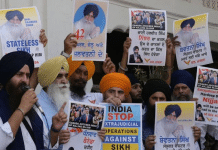WASHINGTON: US President-elect Donald Trump said on Thursday he has chosen former Senator David Perdue to be ambassador to China, tapping a former politician with business experience to help steer relations riven by deep mistrust and trade tensions.
“He will be instrumental in implementing my strategy to maintain Peace in the region, and a productive working relationship with China’s leaders,” Trump said in a post on his social media platform Truth Social.
Trump, who takes office on January 20, 2025, has said he will impose an additional 10% tariff on Chinese goods unless Beijing does more to stop the trafficking of the highly addictive narcotic fentanyl.
He also threatened tariffs in excess of 60% on Chinese goods while on the campaign trail.
Perdue, a Republican from Georgia who served in the Senate from 2015-2021, previously lived in Hong Kong during a 40-year career as a business executive.
Perdue’s nomination marks a return to the frequent practice over recent decades of sending former politicians to the US embassy in Beijing, after President Joe Biden tapped veteran career diplomat Nicholas Burns in 2021.
Trump has nominated China hardliners for other senior roles in his administration, including Senator Marco Rubio for secretary of state, in a signal his policy toward the United States’ main strategic rival could go beyond trade measures.
In his first term as president, Trump named former Iowa Governor Terry Branstad as his ambassador to China. Branstad sought to leverage his ties with Chinese officials, including with Xi Jinping before he became China’s top leader, to help navigate trade tensions. But the two sides still plunged headlong into an unprecedented trade war.
The ambassador’s role in fraught bilateral relations remains to be seen. Some analysts say Beijing is likely to seek direct presidential or high-level engagement with Trump and his closest advisers, in order to navigate the almost-certain return of trade tensions.

















